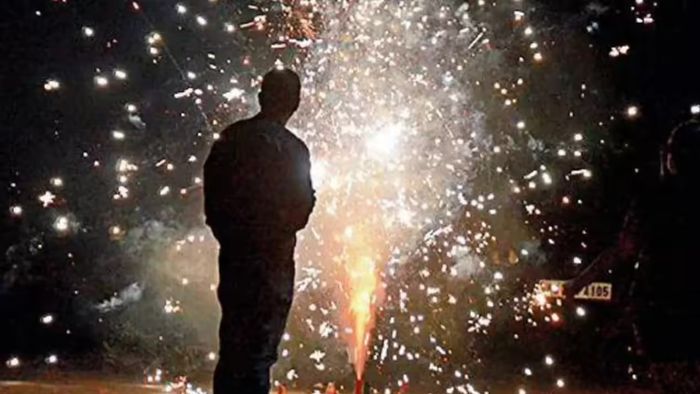After Zubeen, Guwahati’s Diwali turns somber — but air quality deteriorates
AQI data shows Guwahati’s post-Diwali air in 2025 nearly doubles from last year despite muted celebrations

- Oct 22, 2025,
- Updated Oct 22, 2025, 7:50 PM IST
As Assam mourned the loss of its cultural icon Zubeen Garg, this year’s Deepawali was marked by restraint and subdued celebrations across the city. Yet, data from the Assam Pollution Control Board (APCB) indicates that air pollution levels rose significantly in 2025 compared to the previous year.
While the city’s spirit was quieter, the air told another story — heavier, denser, and more polluted.
2024: Cleaner Post-Diwali Air
The day after Diwali in 2024 (01.11.2024) recorded a mean AQI of 113, placing Guwahati’s air in the ‘Moderate’ category.
Data from the Continuous Ambient Air Quality Monitoring Stations (CAAQMS) at four key points — Bamunimaidam, Panbazar, LGBI, and IIT-G — showed steady increases through the night, but within acceptable bounds.
Hourly AQI — November 1, 2024 (Next Day Diwali 2024)
| Time | Bamunimaidam | Panbazar | LGBI | IIT-G | Mean AQI | Category |
|---|---|---|---|---|---|---|
| 6:00 PM | 55 | 33 | 127 | 60 | 68 | Satisfactory |
| 7:00 PM | 62 | 34 | 137 | 61 | 73 | Satisfactory |
| 8:00 PM | 73 | 38 | 142 | 63 | 79 | Satisfactory |
| 9:00 PM | 79 | 37 | 145 | 65 | 81 | Satisfactory |
| 10:00 PM | 88 | 50 | 150 | 72 | 90 | Satisfactory |
| 11:00 PM | 103 | 69 | 159 | 81 | 103 | Moderate |
| 12:00 AM | 118 | 82 | 164 | 89 | 113 | Moderate |
APCB notes indicated minor breathing discomfort for sensitive individuals but overall manageable air quality.2025:
Also Read: Just like Bhupen Hazarika and Jyoti Prasad Agarwala, Zubeen’s legacy won’t be politicised: Himanta
Heavier Air Despite a Silent Festival
During Deepawali 2025 (October 20–21), the AQI rose sharply.
Mean readings on the night of October 21, 2025, reached 145, pushing the city deeper into the ‘Moderate’ bracket and close to the “Poor” threshold.
The pollution persisted late into the night, with peaks near midnight across multiple stations.
Hourly AQI — October 21, 2025 (Diwali 2025)
| Time | Bamunimaidam | Panbazar | LGBI | IIT-G | Mean AQI | Category |
|---|---|---|---|---|---|---|
| 6:00 PM | 174 | 119 | 165 | 120 | 145 | Moderate |
| 7:00 PM | 192 | 127 | 180 | 125 | 156 | Moderate |
| 8:00 PM | 179 | 118 | 180 | 115 | 148 | Moderate |
| 9:00 PM | 179 | 118 | 180 | 115 | 148 | Moderate |
| 10:00 PM | 174 | 114 | 188 | 110 | 147 | Moderate |
| 11:00 PM | 182 | 114 | 188 | 107 | 148 | Moderate |
| 12:00 AM | 182 | 112 | 188 | 99 | 145 | Moderate |
Air quality deterioration was uniform across all stations, showing little relief even in less congested areas like IIT-G.
Comparative Analysis: 2024 vs 2025
| Parameter | Deepawali 2024 (01.11.24) | Deepawali 2025 (21.10.25) | % Change |
|---|---|---|---|
| Mean AQI | 113 | 145 | +28% |
| AQI Category | Moderate | Moderate (borderline Poor) | — |
| Peak Station AQI | 164 (LGBI) | 192 (Bamunimaidam) | +17% |
| Lowest Station AQI | 33 (Panbazar) | 99 (IIT-G) | +200% |
While 2024’s post-Diwali night saw Satisfactory to Moderate air quality, 2025 reflected a clear upward shift in pollution levels — even without the loud celebrations or fireworks that once defined Guwahati’s festival nights.
A Diwali Without Zubeen: A Silent Sky, Heavy Air
For many Guwahatians, this was the first Diwali without the melodies of Zubeen Garg echoing through the night. Streets were quieter, music softer, and the celebrations tinged with grief.
Yet, the irony remained: even in mourning, the air turned heavier.
The data paints a sobering picture — silence may have replaced sound, but pollution remains a constant refrain over Guwahati’s skies.
Despite a visibly muted Deepawali in 2025, Guwahati’s mean AQI rose from 113 to 145, marking a 28% decline in air quality compared to 2024. Experts call for long-term emission control measures beyond festive days to restore breathable air in Assam’s capital.